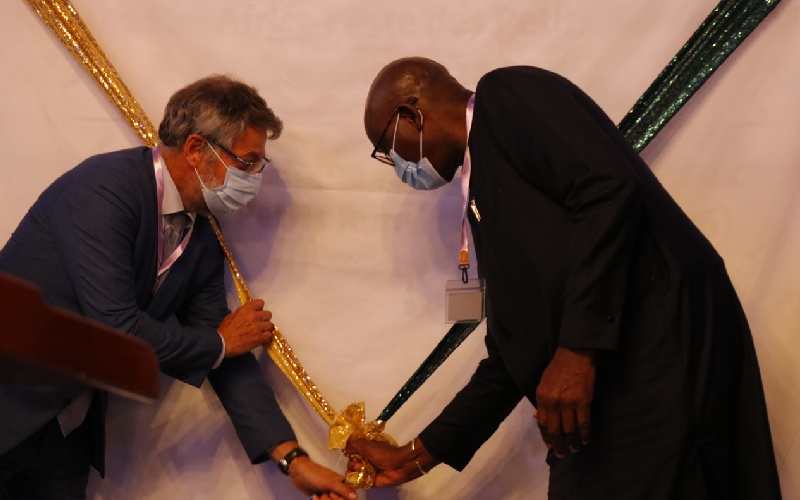AU launches four-year plan to control, eradicate livestock disease
Posted by Mwangi Maina on 17 March 2022 8:20 PM CAT


FAO Eastern Africa Regional Director Dr Bouna Diop with Bernard Rey, Head of Cooperation, EU Delegation to South Africa during the launch of the programme.
AU’s InterAfrican Bureau for Animal Resources (AU-IBAR) has today launched a programme aimed at controlling and eradicating livestock disease.
The 2022-2026 plan is a fresh push to eliminate livestock diseases in Africa which have not only threatened food security but also hurt the livelihoods of millions of livestock farmers.
The bureau’s acting director Dr Nick Nwankpa said the launch of the plan marks a milestone for renewed effort towards enhanced resource mobilisation for the control and eradication of the diseases known as Peste des petits ruminants (PPR) by the global target of 2030.
Nwankpa said the transboundary animal disease is now endemic in nearly the whole of Africa.
‘’This disease has rapidly spread to the rest of Africa and continues to cause devastation of sheep and goats. Its control and eradication require a phased, risk-based approach with well-coordinated and harmonized activities across all regions,’’
The disease is caused by a morbillivirus closely related to the rinderpest virus and affects goats, sheep, and some wild relatives of domesticated small ruminants, as well as camels.
It is characterised by severe morbidity and mortality rates and has a high economic impact in areas of Africa, the Middle East, and Asia, where small ruminants contribute to guaranteeing livelihoods.
Efficient PPR vaccines are available and can induce life-long protective immunity in vaccinated animals.
According to AU-IBAR, out of the population of 821.3 million people in sub-Saharan Africa, an estimated 63 per cent live in rural areas and derive their livelihoods and household food security from livestock, mostly small ruminants and poultry.
These populations were mainly drawn from the Arid and semi-arid lands face challenges of extreme poverty, high gender inequality, vulnerability to drought and the impacts of climate change and poor resilience to drought and other crises.
Dr Nwankpa notes that the PPR is a highly contagious and devastating disease of goats and sheep.
The AU-IBAR further urged partners to focus attention on this key impediment to the implementation of the global, continental, regional and nation PPR programs.
The overall objective of this plan is to contribute to food security, poverty alleviation and resilience of livestock-dependent communities in Africa and the economic growth of the affected countries hence.
Africa has a population of more than one billion people and this is expected to grow at a rate of 2.3 per cent each year.
It is projected that the global human population will increase from 7 billion in 2015 to 9.6 billion in 2050 and that 50 per cent of this increase will in Africa.
This growth in population is accompanied by rising demand for animal products that present opportunities for a wide range of actors in Africa’s livestock value chains.
The continental bureau for Animal Resources is expected to commemorate the 70thanniversary of its formation on Friday.